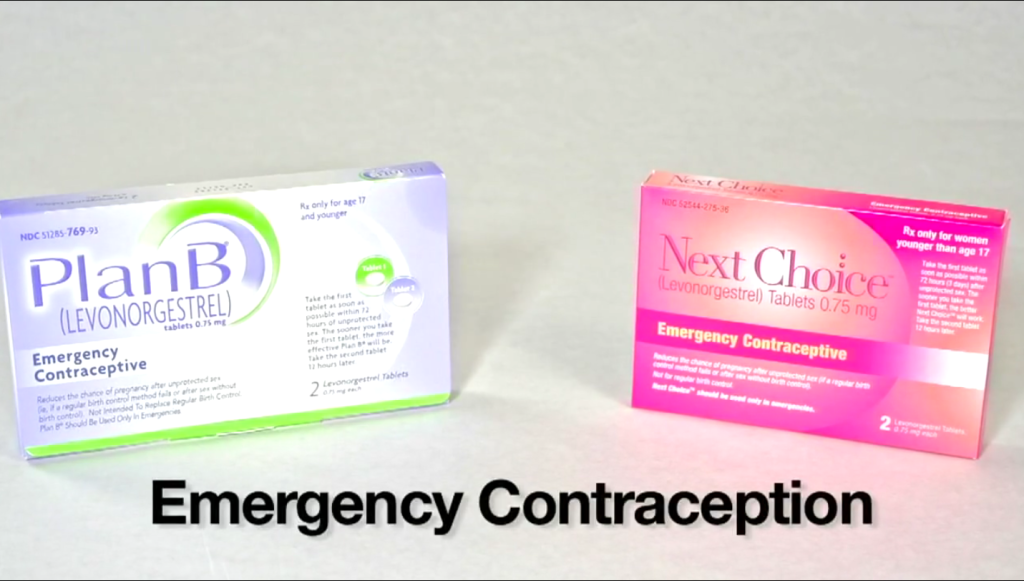What is it?
An emergency dose of certain birth control pills that prevents the sperm from meeting the egg or prevents the egg from attaching to the wall of the uterus (also called “the morning-after pill”)
How does it work?
The pills contain hormones that can prevent pregnancy when taken in larger-than-normal doses. The first dose of pills can be taken within 3 to 5 hours of unprotected intercourse. The next dose of pills is taken 12 hours after the first set. Each dose is made up of two, four, or five pills, depending on the type of pill.
Who uses it?
Emergency contraception is not recommended as a regular birth control method! Instead, it is used for emergencies only. If you are having sex and the condom breaks or slips off, if your diaphragm or cervical cap slips out of place, or you forget your birth control pills 2 days in a row, you may want to consider using emergency contraception. It is also available to teenagers who are forced to have unprotected sex against their will.
How do I get it?
Emergency contraception must be prescribed by a health care provider. It is also available at many health clinics. You must call as soon as possible after having unprotected sex, since it is most effective during the first 72 hours.
Pros
It is legal and available if necessary. Can be used if you are raped.
Cons
The side effects can be severe and are different with every woman. You must get to a health care provider quickly!
Effectiveness
Perfect-use failure rate 25%
Side Effects
Nausea, vomiting, breast tenderness, and headache
IMPORTANT
This is NOT to be used as a birth control method! For emergency use only.
If you have unprotected vaginal intercourse, you may want Emergency Contraception. It:
- can help prevent pregnancy after unprotected vaginal intercourse
- is available from health care providers, Planned Parenthood health centers, and other women’s health and family planning centers
- is provided in two ways:
emergency hormonal contraception — two increased doses of certain birth control pills taken 12 hours apart and within 72 hours of unprotected intercourse
emergency IUD insertion — within five days of unprotected intercourse - is for use only if a woman is sure she is not already pregnant. It keeps the egg from joining with the sperm or prevents the egg from implanting in the uterus. It will not cause an abortion
Effectiveness
A woman’s risk of pregnancy varies from day to day during her menstrual cycle.
Reason not recommended for teens
Some teens may not have transportation to a clinic or health care provider available confidentially and as quickly as needed. This method must be used as soon as possible, 24-48 hours after sex and up to 72 hours. High doses of hormones can make teens very sick (hours of vomiting).
Emergency contraception can reduce that risk:
- Emergency “morning-after” pills — Treatment initiated within 72 hours of unprotected intercourse reduces the risk of pregnancy by at least 75%.
- Emergency IUD insertion — Insertion within 5-7 days of unprotected intercourse reduces the risk of pregnancy by 99.9%.
Possible problems:
| Emergency hormonal contraception | nausea vomiting breast tenderness, irregular bleeding, fluid retention, and headaches |
| Emergency IUD insertion | cramps |
You may want Emergency Contraception if:
- his condom broke or slipped off, and he ejaculated inside your vagina
- your diaphragm or cervical cap slipped out of place, and he ejaculated inside your vagina
- he forced you to have unprotected vaginal intercourse
- you forgot to take your birth control pill more than two days in a row
- you weren’t using any birth control
- he didn’t pull out in time.
For more on Teen Contraception, See Birth Control and Teen Contraception
For info on the Morning After Pill vs. the Abortion Pill…
Contact your health care provider immediately if you have unprotected intercourse.
- For MORE on up-to-date see Emergency Contraception or (EC)
